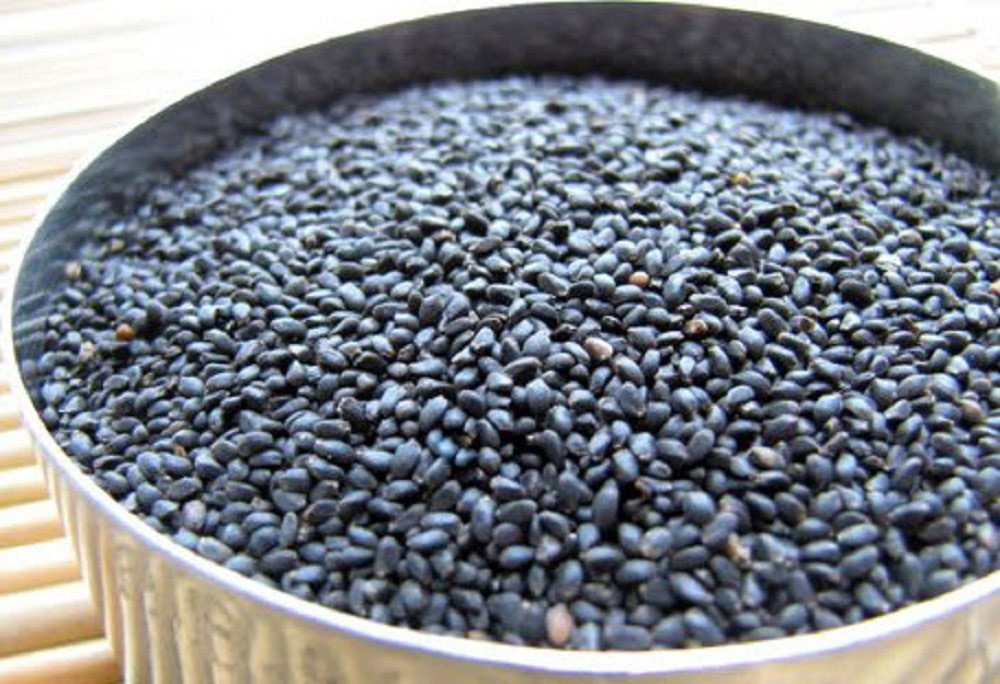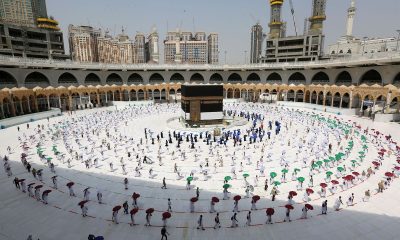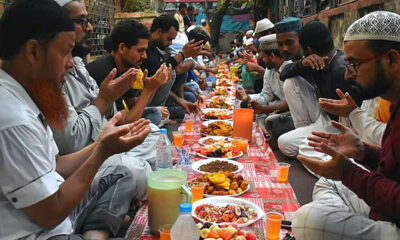News
Black Seed: An essential remedy during Ramadan

Black Seed: An essential remedy during Ramadan
As the holy month of Ramadan is here, Muslims worldwide prepare for a period of spiritual reflection, fasting, and prayer. Alongside these religious practices, attention turns to dietary habits that sustain energy levels and promote well-being during the fasting hours.
Among the various remedies and foods recommended, black seed emerges as a standout due to its rich historical significance and numerous health benefits.
Black seed, also known as Nigella sativa or black cumin, has been valued for its medicinal properties for centuries, with references dating back to ancient civilizations.
In Islamic tradition, the Prophet Muhammad is reported to have said, “Black seed is the remedy for all diseases except death.” This endorsement has cemented black seed’s status as a revered natural remedy within Muslim communities.
During Ramadan, when Muslims fast from dawn to sunset, maintaining energy levels and managing potential health issues become paramount.
Black seed offers a unique solution due to its diverse array of nutrients and bioactive compounds. It contains essential fatty acids, vitamins (such as B-complex and vitamin C), minerals (including calcium, potassium, and iron), and antioxidants like thymoquinone, which contribute to its potent health effects.
One of the primary benefits of black seed during Ramadan is its ability to regulate blood sugar levels. Fasting can sometimes lead to fluctuations in blood glucose, causing fatigue and mood swings.
READ ALSO:
- Putin: Your election not free, fair – UK slams Russia
- Brave female officer CSP Jummai Amawo arrests Kaduna’s notorious kidnapper
- NJC alleges bid by fraudsters to defraud retired judicial officers
However, black seed has been shown to help stabilize blood sugar, providing sustained energy throughout the day and preventing sudden crashes.
Furthermore, black seed possesses anti-inflammatory and immune-boosting properties, which are particularly valuable during Ramadan when the body may be under additional stress due to changes in eating patterns. Consuming black seed can support the body’s natural defenses and alleviate symptoms of common ailments, ensuring a smoother fasting experience.
Research has also highlighted black seed’s potential in promoting digestive health, relieving symptoms of indigestion, bloating, and gas. This is especially relevant during Ramadan, as the pre-dawn meal (suhoor) and the post-sunset meal (iftar) may differ from usual dietary habits, potentially leading to gastrointestinal discomfort.
Incorporating black seed into one’s diet during Ramadan can be achieved in various ways. It can be consumed directly in its seed form, added to dishes as a spice, or taken as an oil or supplement. Many traditional recipes for herbal teas, bread, and desserts incorporate black seed, infusing meals with its distinct flavor and health benefits.
Despite its numerous advantages, it’s essential to remember that black seed, like any supplement or remedy, should be consumed in moderation and as part of a balanced diet. Consulting with a healthcare professional before introducing black seed or any new dietary supplement is advisable, particularly for individuals with existing medical conditions or those taking medications.
As Muslims around the world prepare to observe Ramadan, the significance of incorporating black seed into their dietary regimen cannot be overstated. With its rich history, proven health benefits, and versatility in culinary applications, black seed stands as a valuable ally in ensuring a nourishing and spiritually fulfilling fasting experience.
Black Seed: An essential remedy during Ramadan
News
Tinubu jets out to France on three-day visit

Tinubu jets out to France on three-day visit
President Bola Tinubu will travel to France today (Wednesday) for a three-day state visit at the instance of the French president.
A statement issued by the President’s Special Adviser on Information and Strategy, Bayo Onanuga, confirmed this.
It said, “The Nigerian leader’s three-day visit, which will focus on strengthening political, economic, and cultural relations and establishing more opportunities for partnership, particularly in agriculture, security, education, health, youth engagement and employment, innovation, and energy transition, promises significant benefits for Nigeria.”
Onanuga said Tinubu and Macron would harmonise positions on stimulating more interest in exchange programmes that focus on skill development for youths and improving their competencies in automation, entrepreneurship, innovation, and leadership.
“Both leaders will participate in political and diplomatic meetings highlighting shared values on finance, solid minerals, trade and investments, and communication,” he added.
“They will also witness a session by the France-Nigeria Business Council, which oversees private sector participation in economic development.”
The presidential adviser stated that the Nigerian first lady and her French counterpart would discuss solutions for empowering women, children, and the most vulnerable through the Renewed Hope initiative.
News
Yahaya Bello reports to EFCC office with lawyers

Yahaya Bello reports to EFCC office with lawyers
A former Governor of Kogi State, Yahaya Bello, on Tuesday visited the Economic and Financial Crimes Commission (EFCC) to honour another invitation extended to him over alleged misappropriation of funds.
Bello went to the anti-graft office with his lawyers in the morning.
The ex-Kogi governor reportedly drove himself to the EFCC’s office in a black Toyota Hilux van with some lawyers.
He was said to have been taken by some operatives of the agency and are currently being grilled.
This is coming after the Supreme Court judgment which dismissed a suit brought by some state governments challenging the constitutionality of the agency.
The EFCC at the last hearing on November 14, sought the adjournment till November 27 in the fresh case it instituted against Bello.
It stated that the 30-day window was still running for the summons earlier issued.
News
Just in: Ebonyi governor suspends two commissioners, Perm Sec for misconduct

Just in: Ebonyi governor suspends two commissioners, Perm Sec for misconduct
Ebonyi State Governor Francis Nwifuru has announced the immediate suspension of two commissioners with a permanent secretary among others for gross misconduct.
Those suspended are the Commissioner for Housing and Urban Development Francis Ori, and the Commissioner for Health, Moses Ekuma, with the Permanent Secretary of the Ministry of Health.
The suspension followed an incident on Saturday night, when the governor reportedly visited the Ministry of Health’s premises and was said to have found six officials diverting government materials.
Others suspended for three months are the Executive Secretaries of the State Primary Healthcare Development Agency and the Ebonyi State Health Insurance Agency
The suspension order was announced by the state Commissioner for Information, Jude Okpor, who cited alleged misconduct and dereliction of duties as the reasons for the disciplinary actions.
Okpor made the disclosure on Tuesday during a press briefing on the outcomes of the State Executive Council meeting held on Monday at the New Government House in Abakaliki, the state capital.
“Following cases of gross misconduct and dereliction of duties by some government officials and matters related thereto, the Chairman of Council directed the indefinite suspension of the Honourable Commissioner for Housing and Urban Development and three months suspension of the Honourable Commissioner for Health, respectively
“In view of the development, the Special Assistant to the Governor on Primary Health was directed to take charge of the ministry in the absence of the suspended commissioner.
Governor Nwifuru directed the suspended government officials to hand over all government properties in their possession including vehicles to the Secretary to the State Government.
-

 metro1 day ago
metro1 day agoBREAKING: Port Harcourt refinery begins operation
-

 Business3 days ago
Business3 days agoJust in: Dangote refinery reduces petrol price for marketers
-

 metro2 days ago
metro2 days ago40-foot container falls on car in Lagos
-

 Politics2 days ago
Politics2 days agoLagos 2027: Seyi Tinubu campaign team releases his life documentary
-

 International2 days ago
International2 days agoTrump to sack 15,000 transgender officers from U.S. military: Report
-

 Education18 hours ago
Education18 hours agoUS University opens 2025 scholarships for international students
-

 Entertainment2 days ago
Entertainment2 days agoPolygamy best form of marriage for Africa – Okey Bakassi
-

 Sports19 hours ago
Sports19 hours agoFrench football star, Paul Pogba’s blackmail trial begin in Paris














